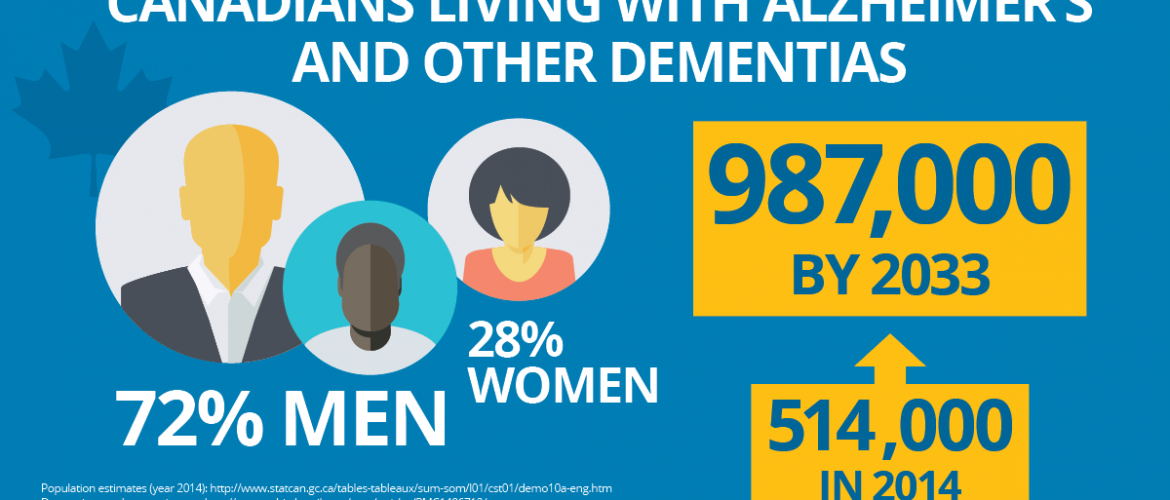The world’s older population is growing dramatically.
According to a report released by the National Institutes of Health (An Aging World: 2015), 8.5 percent of the global population is 65 and over (617 million). Alarmingly, this percentage is projected to jump to nearly 17 percent by 2050 (1.6 billion). Here in Canada, Canadian seniors now outnumber children for the 1st time. There are 5.9 million Canadian seniors (65+), compared to 5.8 million Canadians under the age of 14.
With an aging population comes a number of challenges, but given that January is Alzheimer’s Awareness month, it’s worth noting that as the population ages, so too do the cases of Alzheimer’s Disease. Just this year, reports from the U.S. and Scotland are showing that, in conjunction with an aging population, death rates from Alzheimer’s disease are increasing.
With that said, there are steps everybody can take to combat the development of Alzheimer’s Disease. Specifically, living a healthy lifestyle over the long term can help delay, or deter, the development of this terrible disease.
According to the Alzheimer’s Society of Canada, there are a number of things everybody can do to help promote living a healthy lifestyle, which can help maintain brain function and slow memory decline. Let’s review some of those options.
Follow a Healthy Diet
It is generally known that eating a healthy diet can reduce a number of health risks, such as diabetes, heart disease, and obesity. But eating healthy can also reduce the risk of developing Alzheimer’s disease because nutritious foods can help maintain brain function. A couple of simple steps to follow:
Go for Variety!
Eat a wide variety of foods to get all the disease-fighting potential that variety offers. Limiting selection only allows the benefit from a small portion of what is out there, so make sure to get the benefit from a multitude of food sources.
Fruits and Veggies
Make this a project of colour and go for green, yellow, red, and blue. The nutrients, fiber, and other compounds found in produce can help fight all kinds of diseases, so top up whenever you have the chance.
Keep Sodium Down, Potassium Up
Too much sodium leads to high blood pressure, so aim for less than 2,300 milligrams per day. As well, potassium lowers blood pressure, so foods like citrus fruits, bananas, potatoes, and yogurt should all be a part of a healthy diet.
Be Physically Active
According to the Alzheimer Society of Canada, people who exercise regularly are less likely to develop heart disease, stroke, and diabetes, which are all associated with an increased risk of dementia and Alzheimer’s. For those who are not used to this type of lifestyle, such a shift can be difficult, so plan to accordingly:
Ease Into It
If it’s been a while since your last workout, take it nice and slow. Jumping into an intense workout, or pushing hard without warming up, is a quick way to injury and demotivation. Instead, start with only five or 10 minutes, and gradually increase over time.
Change It Up Over Time
There are a number of options that provide a variety of activities populate a workout plan, so consider sports teams, local gyms, and even workout groups. If doing the same thing over and over again is not for you, then make it exciting and try new activities regularly.
Reduce Stress
Research suggests that stress and anxiety can damage areas of the brain, leading to depression and Alzheimer’s disease. Managing anxiety and stress takes some effort, but a few steps can be built into a daily routine can make a big difference. Consider meditation, being physically active (see above), getting enough sleep, and avoiding long-term stressful environments to help reduce anxiety and stress.
There is an undeniable reality upon us: the global population is getting older, and with an aging population comes an increased risk of developing Alzheimer’s disease. However, living a healthy lifestyle can help reduce the risk factors associated with developing this disease. Reducing stress, being physically active, and following a healthy diet can all make a difference on their own; but combining these strategies together can make a real impact.
Finally, don’t forget to get social with CABHI!


